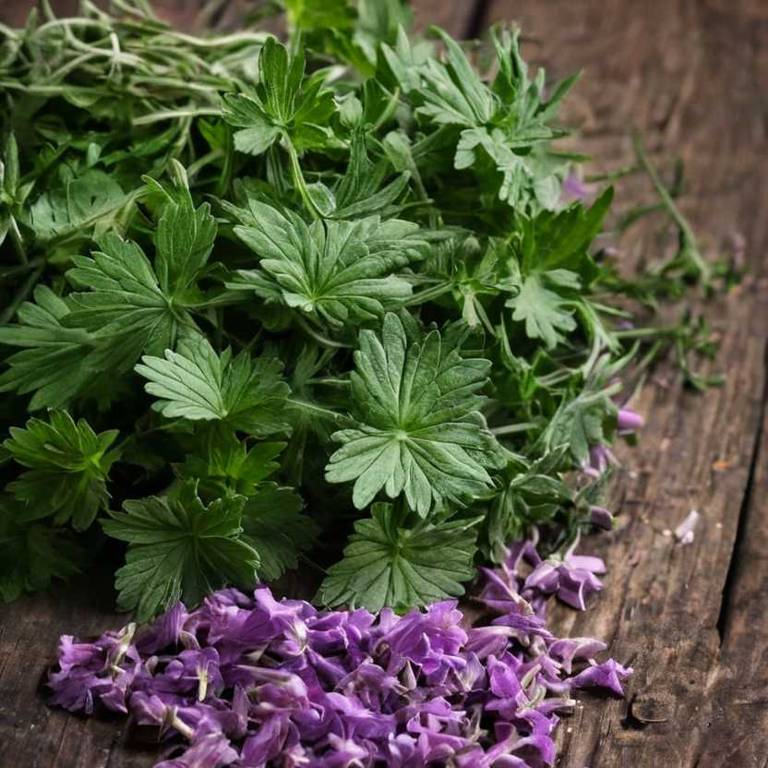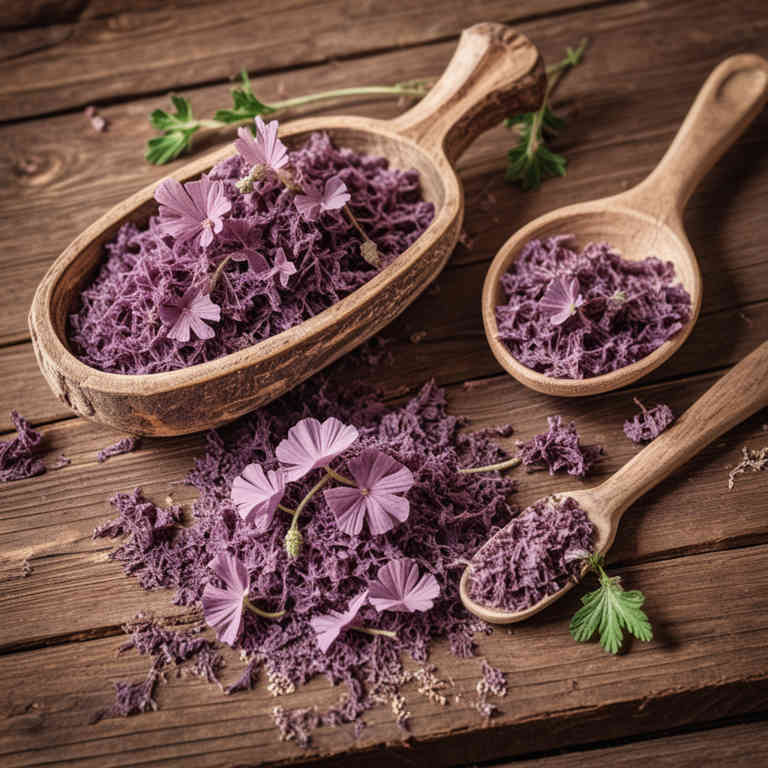10 Best Malva Sylvestris Preparations

The best medicinal preparations of Malva sylvestris are teas, decoctions, mucillages, poultices, and tinctures, each offering unique therapeutic benefits.
Teas made from the dried leaves and flowers are commonly used to soothe digestive issues and promote relaxation.
Decoctions involve simmering the roots to extract their healing compounds, often used for respiratory and skin conditions.
Mucillages, derived from the plant’s fibers, create a thick, soothing substance that can help with inflammation and irritation.
Poultices, made by crushing fresh leaves, are applied topically to reduce swelling and heal wounds, while tinctures provide a concentrated form for internal use in treating ailments like coughs and sore throats.
Below there's a list of the 10 best herbal preparations of malva sylvestris for medicinal purposes.
- 1. Teas
- 2. Decoctions
- 3. Mucillages
- 4. Poultices
- 5. Tinctures
- 6. Creams
- 7. Lozenges
- 8. Oinments
- 9. Oils
- 10. Syrups
1. Teas
Malva sylvestris teas is commonly used to soothe respiratory and digestive issues, as well as to promote skin health.
This herbal preparation is often employed to treat ailments such as coughs, bronchitis, gastritis, and skin irritations. The bioactive constituents responsible for its medicinal properties include mucilage, flavonoids, tannins, and polysaccharides. These compounds contribute to its anti-inflammatory, demulcent, and antimicrobial effects.
Malva sylvestris tea is also believed to support the healing of wounds and reduce inflammation in the respiratory tract.

2. Decoctions
Malva sylvestris decoctions is commonly used to treat respiratory and digestive ailments, as well as skin conditions.
These decoctions are often employed for their soothing and anti-inflammatory properties, making them effective for coughs, sore throats, and gastrointestinal discomfort. They are also used topically to alleviate symptoms of eczema, psoriasis, and other inflammatory skin disorders. The bioactive constituents responsible for these effects include mucilage, flavonoids, tannins, and polysaccharides, which contribute to its demulcent, antioxidant, and antimicrobial activities.
This herbal preparation is valued for its ability to provide relief and support natural healing processes in the body.

3. Mucillages
Malva sylvestris mucillages is commonly used to soothe digestive issues, relieve inflammation, and promote wound healing.
This herbal preparation is widely utilized for treating ailments such as gastritis, ulcers, and skin irritations due to its demulcent and anti-inflammatory properties. The mucillages contain polysaccharides, mucilage, and flavonoids, which contribute to its therapeutic effects. These bioactive constituents help protect mucous membranes, reduce irritation, and support tissue repair.
Its soothing nature makes it a popular remedy in traditional and complementary medicine.

4. Poultices
Malva sylvestris poultices is commonly used to treat skin irritations, inflammation, and wounds due to their soothing and healing properties.
These poultices are often applied to reduce swelling, alleviate pain, and promote the healing of burns, eczema, and other dermatological conditions. The most common medicinal uses include treating boils, abscesses, and minor cuts, as well as reducing inflammation in conditions like arthritis. The bioactive constituents responsible for these effects include mucilage, tannins, flavonoids, and saponins, which have anti-inflammatory, antimicrobial, and wound-healing properties.
These compounds work together to soothe the skin and support the body's natural healing processes.

5. Tinctures
Malva sylvestris tinctures is commonly used to treat respiratory and digestive ailments, as well as skin conditions.
These tinctures are often employed for alleviating symptoms of coughs, bronchitis, and asthma due to their expectorant and anti-inflammatory properties. They are also used to soothe gastrointestinal issues such as indigestion and inflammation of the stomach lining. Additionally, Malva sylvestris tinctures are applied topically to reduce inflammation and promote healing of wounds and eczema.
The bioactive constituents responsible for these effects include mucilage, flavonoids, tannins, and polysaccharides, which contribute to its demulcent, antioxidant, and anti-inflammatory actions.

6. Creams
Malva sylvestris creams is commonly used to treat skin conditions such as eczema, psoriasis, and minor wounds due to their soothing and anti-inflammatory properties.
These creams are often applied topically to reduce redness, irritation, and itching associated with various dermatological issues. The most common medicinal uses include alleviating symptoms of skin inflammation, promoting wound healing, and providing relief from dry or sensitive skin. The bioactive constituents responsible for these effects include mucilage, which has emollient properties, and flavonoids, which exhibit anti-inflammatory and antioxidant activities.
Additionally, the presence of tannins and polysaccharides contributes to the healing and protective effects of the cream.

7. Lozenges
Malva sylvestris lozenges is commonly used to soothe sore throats, reduce inflammation, and alleviate symptoms of respiratory tract infections.
These lozenges are often employed to treat conditions such as pharyngitis, laryngitis, and coughs due to their demulcent and anti-inflammatory properties. The bioactive constituents responsible for these effects include mucilage, which forms a protective coating over mucous membranes, and flavonoids, which have antioxidant and anti-inflammatory actions. Additionally, the presence of tannins contributes to their astringent and soothing qualities.
These lozenges are also believed to support immune function and may help in the management of chronic respiratory conditions.

8. Oinments
Malva sylvestris oinments is commonly used to treat skin conditions, inflammation, and wounds due to its soothing and healing properties.
These oinments are frequently applied for ailments such as eczema, psoriasis, and minor burns. The bioactive constituents responsible for these effects include mucilage, tannins, flavonoids, and polysaccharides, which have anti-inflammatory, antimicrobial, and emollient actions. The mucilage content helps to moisturize and protect the skin, while the flavonoids contribute to its antioxidant properties.
Overall, Malva sylvestris oinments are valued for their ability to promote skin healing and reduce irritation.

9. Oils
Malva sylvestris oils is commonly used to treat skin conditions, respiratory issues, and digestive disorders due to its anti-inflammatory and soothing properties.
The most common medicinal uses include alleviating symptoms of eczema, psoriasis, and other inflammatory skin conditions, as well as easing coughs, bronchitis, and digestive discomfort. These oils are also used in aromatherapy to reduce stress and promote relaxation. The bioactive constituents responsible for these effects include mucilage, which has emollient properties, and flavonoids, which exhibit anti-inflammatory and antioxidant activities.
Additionally, the oils contain essential fatty acids and tannins that contribute to their healing and protective effects on the skin and mucous membranes.

10. Syrups
Malva sylvestris syrups is commonly used to soothe respiratory conditions, such as coughs, sore throats, and bronchitis, due to its demulcent and anti-inflammatory properties.
These syrups are also used to alleviate digestive issues like gastritis and ulcers, thanks to their mucilage content that coats and protects the mucous membranes. The most common medicinal uses include treating respiratory tract infections, reducing inflammation, and providing relief for gastrointestinal discomfort. The bioactive constituents responsible for these effects include mucilage, tannins, flavonoids, and mucopolysaccharides, which contribute to its soothing and healing actions.
These components work together to reduce irritation and promote tissue repair in the respiratory and digestive systems.
